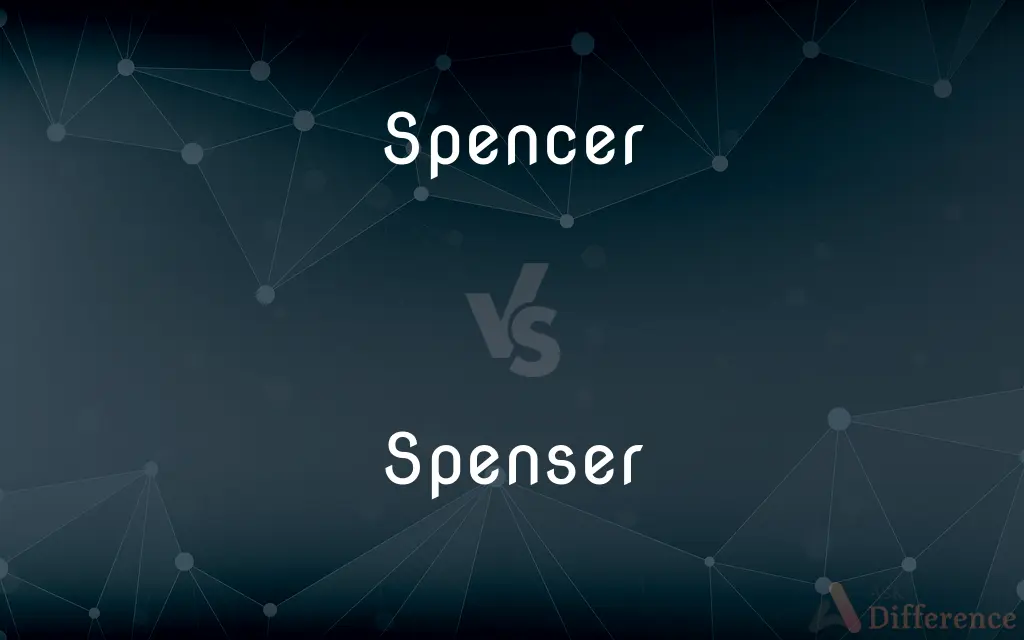Spencer vs. Spenser — What's the Difference?
By Fiza Rafique & Urooj Arif — Updated on May 9, 2024
"Spencer" refers to a common surname or given name, while "Spenser" is often associated with Edmund Spenser, the English poet. Spencer is widely used in contemporary contexts, whereas Spenser is less common and literary in nature.

Difference Between Spencer and Spenser
Table of Contents
ADVERTISEMENT
Key Differences
Spencer is a name of French origin, deriving from the Old French word 'despensier', meaning a steward or dispenser of provisions. On the other hand, Spenser, though similar sounding, is best recognized as the surname of the poet Edmund Spenser, author of "The Faerie Queene."
The name Spencer has been popularized through various cultural figures and celebrities, such as actor Spencer Tracy and Princess Diana's maiden name, Spencer. Conversely, Spenser is less frequently used and is often chosen by those with a literary inclination or admiration for Edmund Spenser's works.
In modern contexts, Spencer is used both as a first name and a surname. Spenser, while also used in both ways, is seen more specifically in a literary context or when referencing the poet directly.
The popularity of the name Spencer has grown significantly over the decades and is used internationally. Spenser remains relatively rare and carries a more niche appeal, often linked to scholarly or artistic circles.
Both names convey an air of tradition and heritage, but Spencer's broader usage in English-speaking countries has made it more mainstream compared to the more specialized association of Spenser with Elizabethan literature.
ADVERTISEMENT
Comparison Chart
Origin
French, meaning steward or dispenser of provisions
Associated with Edmund Spenser, the poet
Common Usage
Common as both a first name and surname
Less common, often literary
Associations
Spencer Tracy, Lady Diana Spencer
Edmund Spenser, "The Faerie Queene"
Popularity
Widely used internationally
Rare, with specific cultural or scholarly use
Cultural Significance
Broad, spans various fields from entertainment to royalty
Primarily literary, tied to Elizabethan poetry
Compare with Definitions
Spencer
Often used as both a given name and a family name.
He signed the letter as James Spencer, carrying on the family tradition.
Spenser
Rare as a first name, primarily known in literary circles.
Spenser's unique name set him apart in the academic community.
Spencer
A common surname or first name of French origin.
Spencer quickly became one of the most popular boys' names in the school.
Spenser
Directly linked to Elizabethan literature and culture.
Studying Spenser's works offers insights into Elizabethan beliefs and values.
Spencer
Traditionally, a steward or someone who managed provisions.
The role of the spencer was crucial in managing the estate's resources efficiently.
Spenser
Occasionally chosen by those with a deep appreciation for poetry.
Her interest in Spenserian sonnets led her to delve deeper into the poet's life and works.
Spencer
Associated with famous personalities and royalty.
Spencer Tracy was one of Hollywood's greatest actors of the early 20th century.
Spenser
Carries a scholarly or artistic connotation.
The name Spenser was chosen for the new library's reading series.
Spencer
Frequently used in English-speaking countries.
In many English-speaking countries, Spencer is a well-recognized name.
Spenser
Less commonly used as a name, often associated with the poet Edmund Spenser.
They named their son Spenser, inspired by their love of Renaissance poetry.
Spencer
A trysail.
Spenser
English poet who wrote an allegorical romance celebrating Elizabeth I in the Spenserian stanza (1552-1599)
Spencer
A short double-breasted overcoat worn by men in the early 1800s.
Spencer
A close-fitting, waist-length jacket worn by women.
Spencer
(historical) A short double-breasted men's overcoat worn in the 18th and 19th centuries.
Spencer
(historical) A short, close-fitting jacket primarily worn by women and children in the early 19th century.
Spencer
(historical) A (usually woollen) vest worn by women and girls for extra warmth.
Spencer
A large loose-fitted gaffsail on a square-rigger or barque, used from the nineteenth century onwards.
Spencer
One who has the care of the spence, or buttery.
Spencer
A short jacket worn by men and by women.
Spencer
A fore-and-aft sail, abaft the foremast or the mainmast, hoisted upon a small supplementary mast and set with a gaff and no boom; a trysail carried at the foremast or mainmast; - named after its inventor, Knight Spencer, of England [1802].
Spencer
English philosopher and sociologist who applied the theory of natural selection to human societies (1820-1903)
Common Curiosities
Why is Spencer more popular than Spenser?
Spencer has broader cultural and historical associations, making it more versatile and widely accepted.
What type of professions would suit the name Spencer?
Spencer suits a variety of professions, from artistic fields to business, given its broad appeal.
Is there a specific reason why parents might choose Spenser over Spencer for their child?
Parents might choose Spenser to reflect a love for literature or to honor the poet Edmund Spenser.
Can Spenser be used as a first name?
Yes, though it is less common, Spenser can be used as a first name, often with literary or artistic significance.
Is Spencer more common as a first name or a surname?
Spencer is frequently used as both a first name and a surname, especially in English-speaking countries.
What is the main difference between Spencer and Spenser?
Spencer is a common name and refers to a steward, while Spenser is historically tied to the poet Edmund Spenser.
Are there cultural references or media where Spencer is commonly used?
Yes, the name Spencer is common in popular culture, used in characters like Spencer Reid from "Criminal Minds" and Spencer Hastings from "Pretty Little Liars."
Was Edmund Spenser the only notable figure with the name Spenser?
Edmund Spenser is the most famous, but the name is also known from the fictional detective series "Spenser" by Robert B. Parker.
How does the popularity of these names change over time?
Spencer's popularity has been relatively stable and is
Are Spencer and Spenser pronounced differently?
No, both names are pronounced similarly, which often leads to confusion between them.
Can Spencer or Spenser have variations in other languages?
Spencer has limited variations due to its Anglo-French roots, though some translations and equivalents exist, like the German "Spencer."
Did the name Spencer originate from a specific country?
Spencer has French origins, derived from 'despensier,' meaning a steward, but it became common in England.
Is there a particular reason why Spenser isn't as commonly used today?
Spenser's association with Edmund Spenser makes it more specialized, appealing to literary enthusiasts rather than the general public.
How did Edmund Spenser influence literature?
Edmund Spenser's poetry, particularly "The Faerie Queene," has had a significant influence on English literature and the development of poetic forms.
Is there any historical or aristocratic connection to the name Spencer?
Yes, Spencer is linked to British aristocracy, particularly the Spencer family, which includes Princess Diana.
Share Your Discovery

Previous Comparison
Juxtaposition vs. Irony
Next Comparison
Flake vs. FleckAuthor Spotlight
Written by
Fiza RafiqueFiza Rafique is a skilled content writer at AskDifference.com, where she meticulously refines and enhances written pieces. Drawing from her vast editorial expertise, Fiza ensures clarity, accuracy, and precision in every article. Passionate about language, she continually seeks to elevate the quality of content for readers worldwide.
Co-written by
Urooj ArifUrooj is a skilled content writer at Ask Difference, known for her exceptional ability to simplify complex topics into engaging and informative content. With a passion for research and a flair for clear, concise writing, she consistently delivers articles that resonate with our diverse audience.












































